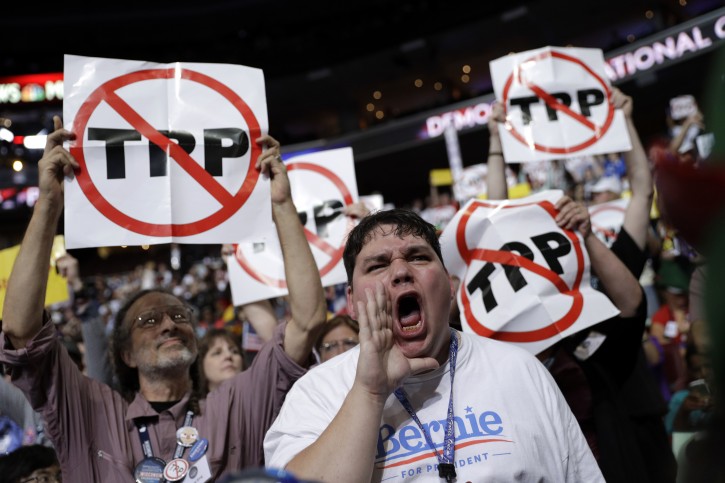
Washington – It’s 30 chapters long and almost nobody has read it, but the Trans-Pacific Partnership trade deal is the unlikely villain at both political conventions.
In Philadelphia this week, opponents interrupted Democratic National Convention speakers with chants of “No TPP” and expressed relief that Bernie Sanders and Hillary Clinton opposed it. At the GOP convention last week in Cleveland, Donald Trump lambasted trade deals like TPP and said they’d “strip our country of its jobs and wealth.”
Even Virginia Sen. Tim Kaine, Clinton’s newly minted running mate, came out against TPP the day after joining the ticket, despite having praised parts of it just days earlier.
Especially striking for Democrats is that President Barack Obama, beloved in the Democratic Party, is the deal’s chief advocate. Obama has worked tirelessly negotiating and then advocating for the agreement, making it a top second-term priority.
Yet while Obama is expected to get a rock-star reception at his convention speech Wednesday, that love-fest won’t extend to trade, where he’s now at odds with Clinton, Kaine, Sanders and the top Democrats in both the House and Senate.
Ironically, Obama’s strongest TPP support has come from congressional Republicans, who joined with fewer Democrats last year to pass legislation expanding Obama’s negotiating authority. Now completed, the deal awaits ratification, and the White House has said it’s confident it can maintain the level of support it got last year.
Even many die-hard opponents acknowledge they’re unfamiliar with the deal’s ins and outs. The sticking points have centered on wonky policy issues like “data localization,” intellectual property and market access — a far cry from hot-button topics like gun control, abortion and taxes that typically drive presidential campaigns.
So, why is TPP resonating? Opponents on both sides have made it a proxy for the powerful fear that American workers are being left behind — albeit in different ways. Where Trump talks about putting “America first” and outmaneuvering other countries, Sanders and Clinton focus on workers’ rights and fighting corporate influence.
“The agreement is incredibly difficult to understand, but the issues it brings up are the exact bread-and-butter issues that matter to voters,” said Julian Zelizer, a Princeton University presidential historian. “What people do know is they’re struggling to find the kind of security that their parents or grandparents had.”
Americans are divided over whether free-trade deals are generally good or bad, but in an AP-GfK poll in early April, 43 percent called the issue very or extremely important. Even more revealing: Forty-six percent said trade deals would decrease jobs available to Americans; only 11 percent said they would increase them.
Obama, meanwhile, has argued major trade deals are always politically difficult, adding that both sides are missing the point: globalization is here to stay.
“What we can do is to shape how that process of global integration proceeds so that it’s increasing opportunity for ordinary people,” he said last week.
So what is TPP?
It’s an ambitious trade pact involving 12 countries on both sides of the Pacific Ocean, including the U.S., Mexico, Japan, Vietnam and Australia. The deal forms a cornerstone of Obama’s attempt to increase U.S. influence in Asia as a counterweight to China.
The deal would eliminate trade barriers and tariffs, streamline standards and encourage investment between the countries, which make up nearly 40 percent of the world’s economic output.
Obama and TPP supporters argue it strengthens labor standards with minimum wage protections and child labor prohibitions. But critics say it undercuts American workers by introducing lower-wage competition and gives huge corporations too much leeway.
In Philadelphia, disdain for the deal has been palpable — and a rare point of unity between supporters of Clinton and Sanders.
Rand Wilson, a union organizer who runs the group Labor for Bernie, carried 2,000 “No to TPP” signs into the convention. He said if Clinton shows full commitment to stopping TPP, it could help rally reluctant Sanders supporters to her side.
“They will be excited, and it would draw the party together,” said Wilson, 63.
As reported by Vos Iz Neias
